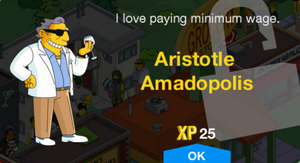|
|
| (One intermediate revision by one other user not shown) |
| Line 17: |
Line 17: |
| | | | |
| | == History == | | == History == |
| − | He was introduced to [[Homer]] by [[Mr. Burns]] after Homer unwittingly "saves" the plant from a total meltdown. Ari wanted Homer to give a pep talk to his plant's lackluster workers about what it means to be a valuable employee. Homer was, however, hesitant to accept, but Mr. Burns forces him into it. At the Shelbyville nuclear power plant, Homer gave a bumbling speech when an impending meltdown threatened the Shelbyville plant. They all turned to "Hero Homer" and ushered him into the control room, asking him to perform his heroic deeds once more. In front of everyone, Homer repeated his juvenile rhyme that saved him the first time and presses a button blindly and once more by sheer dumb luck, he manages to avert this meltdown as well. Ari was bewildered that his supposed "hero" was such an idiot. But Homer is even more widely derided as a lucky imbecile than he was hailed as a hero, and "to pull a Homer" becomes a widely-used phrase meaning "to succeed despite idiocy".<ref name="defined"/> | + | He was introduced to [[Homer]] by [[Mr. Burns]] after Homer unwittingly "saved" the plant from a total meltdown. Ari wanted Homer to give a pep talk to his plant's lackluster workers about what it means to be a valuable employee. Homer was hesitant to accept, but Mr. Burns forced him into it. At the Shelbyville nuclear power plant, Homer gave a bumbling speech when an impending meltdown threatened the Shelbyville plant. Everyone turned to "Hero Homer" and ushered him into the control room, asking him to perform his heroic deeds again. In front of everyone, Homer repeated his juvenile rhyme that saved him the first time, pressed a button blindly, and once again, by sheer dumb luck, managed to avert the meltdown. Ari was bewildered that his supposed "hero" was such an idiot. However, Homer became more widely derided as a lucky imbecile than he was hailed as a hero, and "to pull a Homer" became a widely used phrase meaning "to succeed despite idiocy".<ref name="defined"/> |
| | | | |
| − | Aristotle and Mr. Burns' power plants competed against each other in a game of softball. Burns and Amadopolis put a bet of a million dollars on the game, Ari lost.<ref name="bat"/> | + | Aristotle and Mr. Burns' power plants competed against each other in a game of softball. Burns and Amadopolis bet a million dollars on the game, and Ari lost.<ref name="bat"/> |
| | | | |
| | He was seen at [[Moe's Tavern]] when [[Artie Ziff]] went bankrupt.<ref>"[[The Ziff Who Came to Dinner]]"</ref> | | He was seen at [[Moe's Tavern]] when [[Artie Ziff]] went bankrupt.<ref>"[[The Ziff Who Came to Dinner]]"</ref> |
| Line 25: |
Line 25: |
| | == Non-canon == | | == Non-canon == |
| | {{Noncanon}} | | {{Noncanon}} |
| − | Aristotle is also a long time rival of Mr Burns since they were young men and they would often fight each other using hired professional fighters or soldiers.{{cn}}
| |
| | === The Simpsons: Tapped Out === | | === The Simpsons: Tapped Out === |
| | {{TranscludeSection|The Simpsons: Tapped Out characters/More Business Owners|Aristotle}} | | {{TranscludeSection|The Simpsons: Tapped Out characters/More Business Owners|Aristotle}} |
| Line 41: |
Line 40: |
| | {{Season15A | | {{Season15A |
| | |E14=yes | | |E14=yes |
| − | }}- | + | }} |
| | {{Season17A | | {{Season17A |
| | |E13=yes | | |E13=yes |
Aristotle and Mr. Burns' power plants competed against each other in a game of softball. Burns and Amadopolis bet a million dollars on the game, and Ari lost.[2]







